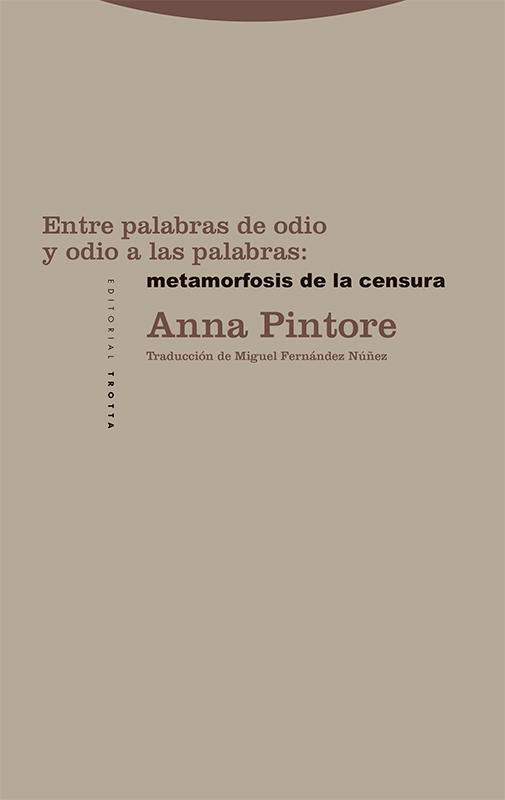There is currently a solid movement of repulsion and indignation against the iron censorship established by the governments of the European community as a result of the intensity of our Western civilization's fight against "hate speech" in the press and media in general, which are even already typified in Community law, together with the intense means of regulation and condemnation that have been established (p. 12).
Professor Anna Pintiore, professor of philosophy of law at the University of Cagliari, has written an intense work on censorship in liberal society, its limits and methodology, in order to stop the birth of a new inquisitorial court in the countries of Europe that will return to judge intentions, beliefs and opinions (p. 15).
It is worth remembering the juridical principle from Roman law: "De internis neque Praetor iducat", which would pass, as it did, into canon law: "De internis neque Ecclesia iudicat". This principle of not judging intentions and thoughts was so often invoked to achieve the abolition of inquisitorial law.
Inquisition
Indeed, the objective of the modern tribunal approved by Sixtus IV in 1478 to put an end to the Judaizing heresy in Spain that had spread in Castile and Aragon, seemed to them to make "necessary" the implementation of an effective method to achieve the longed-for unity of the faith.
Undoubtedly 75% of the processes took place between 1478 and 1511. Hence, the tribunal should have been abolished and the defense of the faith left in the hands of the diocesan Ordinaries, as was decided after a violent discussion in the Cortes of Cadiz in 1812.
– Supernatural Inquisition It could have been suppressed, but the climate of intense lack of formation of the people and the clergy and the perfect superstructure that had been created favored the maintenance of this unworthy tribunal, for no one should be judged within himself except by God, for "by their fruits you shall know them".
That is the great evil of the tribunal of the Inquisition, to have given way to the inquisitorial mentality that consisted, then and now, in judging the ideas and intentions of others, without contrasted data and causing distrust and destruction of the honor and fame of people for several generations. In fact, the Catechism of the Catholic ChurchThe Catechism of Trent went so far as to affirm that honor and fame were as important as life itself.
Right of defense
At the same time, Professor Anna Pintore points out that the liberal state has the right to defend itself against falsehoods written by an author in a book, in a newspaper article or in the media, since they can undermine the social or moral foundations on which the state and civic coexistence are built (p. 21). In other words, it would be convenient to "redefine censorship in terms of convenience" (p. 23 and 32).
There is no doubt that Michel Foucault revealed himself as an enemy of Hobbes when, in Leviathan, he demanded the surrender of citizens' freedom so that the absolutist state could build a lasting and stable peace. Logically, peace without freedom is impossible to maintain in a culture that has experienced freedom (p. 33).
It is amusing to see how our author entangles herself in a "vulgar play on words" when she pretends to oppose an "external, coercive and repressive" censorship to a "modern censorship" that would be "productive, structural and necessary" (p. 34).
In fact, throughout the pages of this book, the conviction that the only possible censorship is "self-censorship", derived from common sense, prudence, deep convictions, love for one's own and others' freedom, respect for the opinions of others and the deep desire to contribute with our criticism to the common good and the dignity of the human person and to safeguard the principle of the presumption of innocence and the good faith of individuals, will emerge (p. 38).
Agreed censorships
It is interesting to see how there are fields of "agreed censorship" that are markedly ideologized, even in our democratic times, such as the following exposed by our author: "institutional regulation of free expression, market censorship, cuts in government funding for controversial art, boycotts, prosecution and marginalization and exclusion of artists based on their gender or race, to 'political correctness' in academia and the media, so much so that the term is overwhelmed, even trivialized" (p. 41-42).
Undoubtedly, our author expresses her perplexity before the abundance of literature and opinions that wish to further restrict freedom of expression, especially since the abusive invasion of the Internet, which has filled the web with opinions of the most varied and solid origin. Two apparently conflicting principles are invoked: freedom of expression and equality (p. 51).
It is very important how he arrives at this major conclusion: "hate speech (and pornography) should be banned not insofar as it excludes the voice of its victims from the public arena, but because it is morally reprehensible, that is, because it is unacceptable in the light of the human rights ethic that has been affirmed in the Western world (and we add the dignity of the human person)" (p. 67).
Finally, we take up, by way of our author's conclusion, the last words of her book: "The metamorphosis of censorship that has taken place in recent decades is certainly not the only factor that has determined this situation, but it has certainly created an extremely welcoming intellectual environment for it. Given the success enjoyed today by the ideas that have been criticized here, one cannot be very optimistic about the future of freedom of expression" (p. 85).
Between words of hatred and hatred of words









